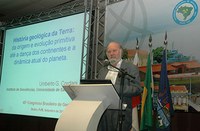 Rocks may chip and crack, but they do not age. At least, they do not age the way humans do.
Rocks may chip and crack, but they do not age. At least, they do not age the way humans do.
Experts, however, can determine the age of rocks by using high-technology dating techniques that delineate young rocks from old ones.
Umberto Cordani, professor emeritus at the University of São Paulo's (USP) Institute of Geosciences in Brazil, is a world-renowned Earth scientist with a sterling reputation in the field of geochronology – the science of determining the age of rocks, sediments and fossils.
"Geochronology," explains Cordani, "is not just a research exercise for the sake of knowledge. It provides key insights into the behaviour of our planet over the 4.6 billion years of its existence."
Such insights can help scientists better understand the dynamics that, for example, drive continental drift and cause mountains to rise. Rock dating can also unlock critical information about the ecological impacts of development, climate change and other human activities that leave a deep footprint on Earth's ecology. Cordani, who is the founding director of the USP's Laboratory of Geochronology and has been a researcher there for more than 40 years, was elected a TWAS Fellow in 1990.
Born in Italy, his family, like many other families in Italy, moved to Brazil in 1949. In the 1960s, he was accepted to the University of California at Berkeley, USA, where he studied under the tutelage of John Reynolds, an internationally renowned physicist who developed a mass-spectrometer that relied on the "potassium-argon method" to measure the age of rocks and minerals.
"The radioactive isotope potassium 40," Cordani explains, "undergoes natural radiogenic decay, ultimately turning into argon 40, a gas that accumulates inside rocks. Reynolds' mass-spectrometer allows scientists to measure the level of this argon isotope in rocks. That, in turn, provides a reliable measure of the rocks' age."
Cordani's thesis, which he completed in 1968, not only confirmed the young age of volcanic rocks found on two Brazilian oceanic islands, Fernando de Noronha and Trindade (as previously suggested by Cordani himself), but also validated a method that became the gold standard for geochronologists.
A year earlier, Cordani, with colleagues from the Massachusetts Institute of Technology (MIT) in the USA, published a paper in Science that concluded rocks in Northeast Brazil and West Africa exhibited very similar ages. This finding helped to verify the theory of plate tectonics, which explains why the upper layer of our planet, or lithosphere, shifts and faults.
Cordani, who has authored more than 120 research articles, books or book chapters, is well known among his colleagues for editing Tectonic Evolution of South America, a landmark publication in the field of geotectonics.
"Development and environment," Cordani notes, "are part of the same equation. We must understand the Earth's dynamics to successfully address such critical issues as water and soil conservation, desertification and deforestation. Greater understanding of the Earth's dynamics will prove essential for meeting the social and economic needs of a growing population without placing excessive pressure on the Earth's resources."
"As global population and wealth continue to increase, science-based insights into geological stress will become even more important," Cordani says. That is why he has recently turned his attention to training a new generation of scientists conversant in Earth's geology – an initiative that he is pursuing with the same enthusiasm and commitment that he has applied to his lifelong study of rocks.

